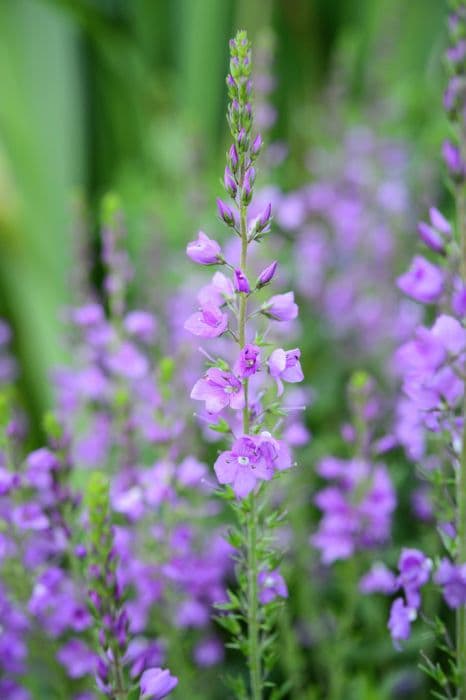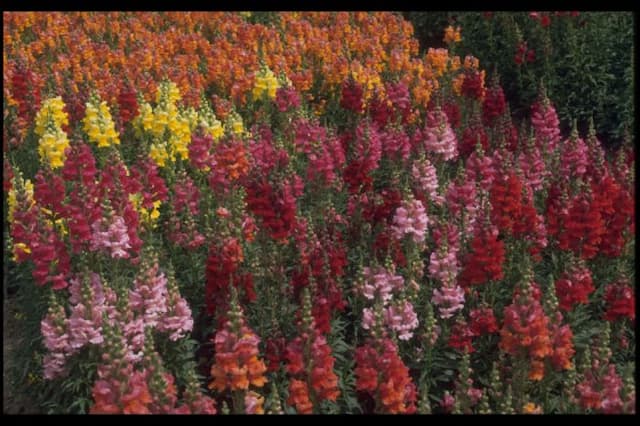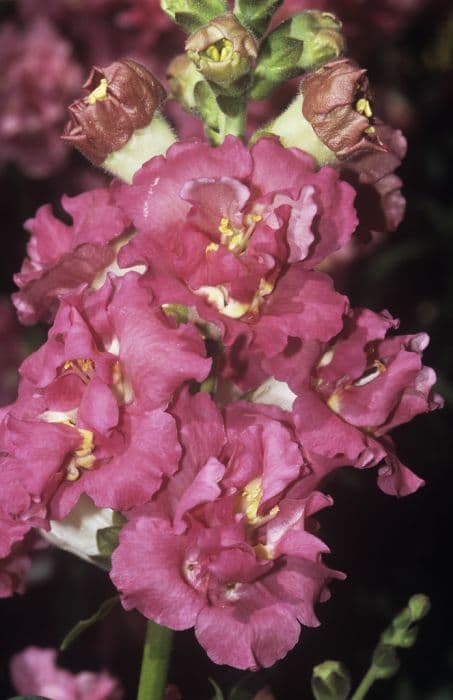Speedwell Veronica 'Ellen Mae'

ABOUT
Veronica 'Ellen Mae', more commonly known as speedwell, is a charming perennial plant noted for its beautiful flowers and foliage. This variety of speedwell is adorned with spikes of small, star-shaped flowers that bloom prolifically. The blooms are a vibrant shade that adds a pop of color to any garden setting. These blossoms are typically arranged in dense, clustered racemes that rise elegantly above the foliage. The foliage itself consists of lush, green leaves that form a neat, low-growing mound. The leaves are simple in shape with a smooth or slightly serrated edge, contributing to the plant's overall textured appearance. During the blooming season, the contrast between the bright flowers and the verdant foliage is particularly striking, making Veronica 'Ellen Mae' a favorite among gardeners looking to add a touch of visual interest to their plantings.
About this plant
 Names
NamesSynonyms
Speedwell, Bird's Eye, Gypsyweed
Common names
Veronica longifolia 'Ellen Mae'.
 Toxicity
ToxicityTo humans
The Veronica 'Ellen Mae', commonly known as Speedwell, generally is not considered toxic to humans. However, as with any plant material, individual sensitivities can vary, and ingestion might cause mild stomach irritation in some people.
To pets
Speedwell is also not commonly known to be toxic to pets. If a pet ingests a large amount of the plant, it might experience mild gastrointestinal upset, but serious poisoning is unlikely.
 Characteristics
CharacteristicsLife cycle
Perennials
Foliage type
Deciduous
Color of leaves
Green
Flower color
Pink
Height
1-2 feet (30-60 cm)
Spread
1-2 feet (30-60 cm)
Plant type
Herb
Hardiness zones
4
Native area
Europe
Benefits
 General Benefits
General Benefits- Attracts Pollinators: Veronica 'Ellen Mae' is known to attract bees and butterflies, helping to pollinate nearby plants.
- Low Maintenance: This plant requires minimal care, making it ideal for gardeners of all levels.
- Drought Tolerant: Once established, it can tolerate periods of dryness, reducing the need for frequent watering.
- Long Blooming Period: It has a lengthy flowering season, providing color and interest to gardens for much of the year.
- Deer Resistant: The plant is not favored by deer, which can help to reduce damage in areas where deer are a common issue.
- Ground Cover: Its growth habit can provide ground cover, suppressing weeds and reducing soil erosion.
- Aesthetic Appeal: With its striking blue to purple flowers, Veronica 'Ellen Mae' adds visual interest to any landscape.
- Hardy: It is capable of withstanding colder temperatures and is generally a hardy plant in appropriate zones.
 Medical Properties
Medical PropertiesThis plant is not used for medical purposes.
 Air-purifying Qualities
Air-purifying QualitiesThis plant is not specifically known for air purifying qualities.
 Other Uses
Other Uses- Veronica 'Ellen Mae' can be used as a natural dye for fabrics, offering a range of subtle green and blue hues depending on the mordant used.
- The plant's sprawling habit and attractive foliage make it a good option for themed miniature gardens or fairy gardens.
- Pressed Veronica 'Ellen Mae' flowers can be used in crafting, for example, to create bookmarks, greeting cards, or in scrapbooking to add a touch of nature.
- It can be planted in between pavers or stepping stones, where it will lend a soft, verdant look as it spreads minimally around the stones.
- Veronica 'Ellen Mae' is used in floral arrangements, both fresh and dried, to add a delicate texture and depth to bouquets or centerpieces.
- The plant might be used in educational settings, such as schools or botanical workshops, to teach propagation techniques due to its easy-to-root stems.
- Its sprawling nature and tendency to attract pollinators like bees and butterflies make it ideal for a butterfly or bee garden, which aims to support local ecosystems.
- Veronica 'Ellen Mae' is suited for creating living mulch in garden beds, suppressing weeds, and helping to retain soil moisture.
- The speedwell can serve as an indicator plant; it can signal soil health or the onset of certain seasons based on its flowering and growth patterns.
- Children's gardens can incorporate Veronica 'Ellen Mae' due to its non-toxicity and to add visual appeal with its blue flowers that can spark interest in gardening.
Interesting Facts
 Feng Shui
Feng ShuiThe plant Veronica is not used in Feng Shui practice.
 Zodiac Sign Compitability
Zodiac Sign CompitabilityThe plant Veronica is not used in astrology practice.
 Plant Symbolism
Plant Symbolism- Fidelity - Veronica 'Ellen Mae' is often associated with faithfulness and steadfast love due to its enduring qualities and the interconnectedness of its petals.
- Healing - With historical roots in medicine, this plant symbolizes healing and the soothing of wounds, both physical and emotional.
- Remembrance - The plant is occasionally used to signify remembrance, its lingering presence serving as a memory of important people, moments, or events.
 Water
WaterFor Veronica 'Ellen Mae', commonly known as Speedwell, it's essential to maintain consistently moist soil without waterlogging. Water the plant deeply every week, ensuring that the soil is damp to a depth of at least two inches. During hot and dry periods, increase watering frequency to maintain moisture levels, providing up to 1.5 gallons per plant per watering session. Reduce the amount of water during cooler months to prevent root rot; however, don't let the soil dry out completely. Seasonal variations and local conditions will dictate the exact watering schedule.
 Light
LightSpeedwell thrives best in full sun to partial shade conditions. For optimal growth, place Veronica 'Ellen Mae' in a spot where it receives at least six hours of sunlight daily. This plant can tolerate some afternoon shade, but too much shade can lead to leggy growth and fewer blooms.
 Temperature
TemperatureVeronica 'Ellen Mae' or Speedwell prefers temperatures between 65°F and 75°F for ideal growth. It can withstand minimum temperatures down to around 20°F and maximum temperatures up to 85°F. Avoid exposure to extreme heat or cold as this can stress the plant and impair its growth.
 Pruning
PruningPrune Speedwell in late winter or early spring to encourage bushy growth and more flowers. Remove dead or damaged stems and cut back the entire plant by about one-third to one-half to stimulate new growth. Deadheading, or removing spent flower spikes, will promote further blooming throughout the season. Annual pruning and deadheading are typically sufficient for Speedwell.
 Cleaning
CleaningAs needed
 Soil
SoilThe best soil mix for Speedwell 'Ellen Mae' is well-draining garden soil combined with organic matter, such as compost or peat moss, to enhance fertility. The ideal soil pH should be neutral to slightly acidic, ranging from 6.0 to 7.0.
 Repotting
RepottingSpeedwell 'Ellen Mae' does not require frequent repotting and should be repotted every 2-3 years, or when it becomes root-bound and the growth seems to be hindered.
 Humidity & Misting
Humidity & MistingSpeedwell 'Ellen Mae' prefers moderate humidity levels but is adaptable to various conditions; avoid overly humid environments to prevent fungal diseases.
 Suitable locations
Suitable locationsIndoor
Ensure bright light and well-draining soil for indoor Speedwell 'Ellen Mae'.
Outdoor
Plant in full sun to partial shade with moist, well-drained soil for outdoor Speedwell 'Ellen Mae'.
Hardiness zone
4-8 USDA
 Life cycle
Life cycleVeronica 'Ellen Mae', commonly known as Speedwell, begins its life as a seed, requiring a period of stratification to break dormancy before germination can occur in spring. Upon germination, the seedling emerges and develops a rosette of leaves at the soil level, followed by upright growth as the plant matures. Vegetative growth continues, with the plant forming a robust root system and foliage. In early to mid-summer, Speedwell produces spikes of small, attractive flowers that offer ornamental appeal and can attract pollinators. After flowering, seed formation takes place, completing the reproductive cycle. The plant then enters a period of dormancy in winter, surviving as a perennial with the cycle beginning anew the following spring.
 Propogation
PropogationPropogation time
Spring-Early Summer
Veronica 'Ellen Mae', commonly known as speedwell, is often propagated in the spring or early summer to allow sufficient time for the young plants to establish themselves before the cooler weather sets in. The most popular method of propagation for this plant is by division. To propagate by division, carefully dig up an existing mature plant and gently separate it into smaller sections, ensuring that each section has a portion of the root system attached. These divisions can then be immediately replanted into a well-draining soil mix, keeping them watered until they are established. The optimal time for division is typically when the plant is not in active bloom to minimize stress and encourage quick root development. Aim for a cool, overcast day to divide and replant to reduce transplant shock.





![Snapdragon [Pretty in Pink]](/_next/image?url=https%3A%2F%2Fplants-admin.emdemapps.com%2Fimages%2Fplants%2F%2Fimages%2F604b5cb3b5385.png&w=640&q=75)



